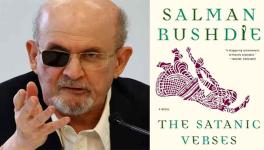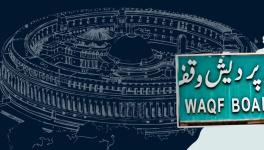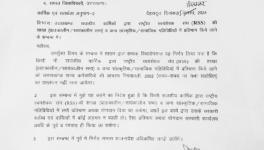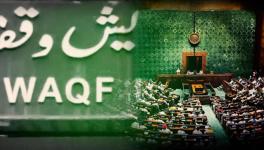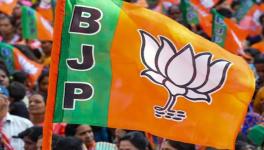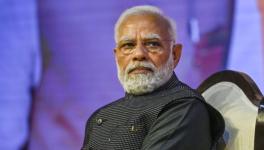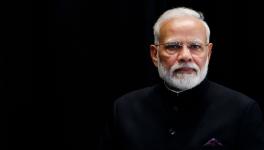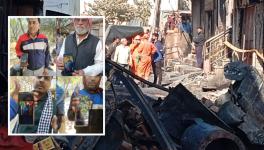Delhi Violence: Hindu-Muslim Polarisation ‘Deliberately Fuelled’ Much Earlier, Says Citizen’s Report
Representational use only. Image Courtesy: PTI
New Delhi: Expressing deep concern over the failing health of democracy in India, eminent citizens, including retired judges and bureaucrats, have noted the “deafening lack institutional will” to act against hateful content and hate messaging in public discourse, leading to growing violence against the minority community across the country.
The report, Uncertain Justice: A Citizens Committee Report on the North East Delhi Violence 2020, Justice Madan B. Lokur, former Judge of the Supreme Court (Chairperson), Justice A.P. Shah, former Chief Justice of the Madras and Delhi High Courts and former Chairman, Law Commission, Justice R.S. Sodhi, former Judge of the Delhi High Court, Justice Anjana Prakash, former Judge of the Patna High Court, G.K. Pillai, IAS (Retd.), former Home Secretary, was brought by the Constitutional Conduct Group, consisting of several former civil servants, after the violence in Northeast Delhi.
It may be recalled that communal violence flared up in Northeast Delhi at a time when protests against the Citizenship Amendment Act or CAA were at their peak across the country, including in the capital, which was also preparing for Assembly elections. The violence left 53 people dead, most of whom were Muslims.
The report released recently is in three parts and examines different facets of the violence from its genesis, nature, and aftermath.
The report noted that polarisation between the Hindu and Muslim communities, particularly anti-Muslim hate, was “deliberately fuelled in the months preceding the violence.”
“The Muslim community was grappling with deep fears of loss of citizenship, stemming from the combined effect of the Citizenship (Amendment) Act, 2019 (CAA), passed in December 2019, with potential exclusion through the National Register of Citizens process. By mid-December 2019, nationwide protests erupted against the law. Delhi emerged as the epicenter of the anti-CAA movement with North East Delhi as the site of multiple sit-in protests. Against this background, the campaigning for the Delhi Assembly elections gathered momentum in January,” said the report, noting that the ruling Bharatiya Janata Party (BJP) focused its election campaign on the CAA issue, within a divisive narrative framing the anti-CAA protests as “anti-national and violent” with their leaders, such as Anurag Thakur (now a Central minister) and Kapil Mishra, labelling the protesters as “traitors”.
Expressing disquiet at the role of national television channels and social media in amplifying hate, the report also decried the “vilification of the protests and anti-Muslim hate.”
Examining episodes aired in December 2019-February 2020 of primetime shows of the six most viewed television news channels, the report noted that channels that lead in amplifying hate were Republic and Times Now (English), and Aaj Tak, Zee News, India TV, and Republic Bharat (Hindi).
“We also examined relevant posts on various social media platforms. The analysis reveals that the channels’ reportage of events surrounding the CAA framed the issues as “Hindus versus Muslims” with prejudice and suspicion against the Muslim community. These channels concentrated on vilifying anti-CAA protests, fanning unsubstantiated conspiracy theories, and calling for their forcible shutdown”, said the report.
The committee concluded that the prevalence of hate “significantly contributed” to creating a climate in which a significant section of society became receptive to incitement and calls for violence against the Muslim community.
State Failures
Noting the lack of will by the authorities to stem the communal poison being spread, the committee noted that “all stages of the February 2020 violence – the inception, occurrence and aftermath (investigation of the violence) – are characterized by a frightening undermining of democratic values. Tragically, the communal polarization that heralded the violence has been hardened by state responses to the violence.”
Condemning the role of the law & order authorities, the report questioned the role of the Delhi Police which “failed to take punitive measures against hate speeches made by political leaders and others in the run-up to February 23 or on the day itself. Allegations of police assisting mobs and participating in attacks on Muslims, anti-CAA protest sites, and mosques have been documented, in eyewitness, media and affected persons’ accounts. The Committee has obtained a limited, but credible mass of information indicating abject police failures, including apparent police complicity, of varying degrees in the violence.”
The report called for an independent, possibly a court-monitored investigation, into the role of the Delhi Police, which falls under the Union Home Ministry.
“Despite having command over both the Delhi Police and the central paramilitary forces, the MHA failed to take effective steps to stem the spread of communal violence. Repeated assurances on February 24 and 25 by police top brass and government officials that the situation was under control did not match the visibility of violence on the ground.”
It added that though “internal alerts circulated by the Delhi Police advised increased police deployment in North East Delhi on February 23 itself, official data shows that deployment rose only on 26 February. It appears that the numbers of police personnel were not increased on 24-25 February, even though the maximum number of distress calls were received by the Police Stations in North East Delhi on these days.”
Delhi Government
The committee also found that that the Aam Aadmi Party-government in Delhi did “precious little during this entire time to mediate between the communities, even with the sharp warning signs in the lead up to February 23.”
Also, the Delhi Government failed to ensure timely and adequate relief and compensation to those affected by violence, it said, after visiting many riot affected areas.
Gaps in probe
The report’s analysis found anomalies and inconsistencies in certain material put forward by Delhi Police in the chargesheets.
“...The allegation of an overarching premeditated conspiracy aimed at orchestrating communal riots – is based on unexplained, belated statements which are inherently unreliable in law. A comparison of the investigation in the Indian Penal Code (IPC) FIRs with the investigation into the same allegations in FIR 59 reveal a number of contradictions and inconsistencies. These further cast a shadow on the claims made in the first chargesheet.”
It also noted that the police neglected to investigate the role played by those who made “hateful speeches and gave calls to mobilise for discharging violent acts, in close proximity to the onset of violence.”
Overall, the committee concluded that the overall direction of the investigation appeared skewed and omits to examine the connections between the outbreak of the violence with the spate of hate speeches and calls for violence.
The report also noted patterns of larger use of the UAPA that suggest its “targeted application by the state” and called for comprehensive review of the Act.
Calling for setting up an independent Commission of Inquiry for an impartial probe into the North East Delhi violence, the committee said that the communal episode had “set back the internal processes through which a multi-cultural society engenders calm and harmony, forging its plurality into a strength,” adding that the only way forward is for the state to act towards “justice harboured in the conjoined practice of fraternity, equality and freedom.”
Get the latest reports & analysis with people's perspective on Protests, movements & deep analytical videos, discussions of the current affairs in your Telegram app. Subscribe to NewsClick's Telegram channel & get Real-Time updates on stories, as they get published on our website.









